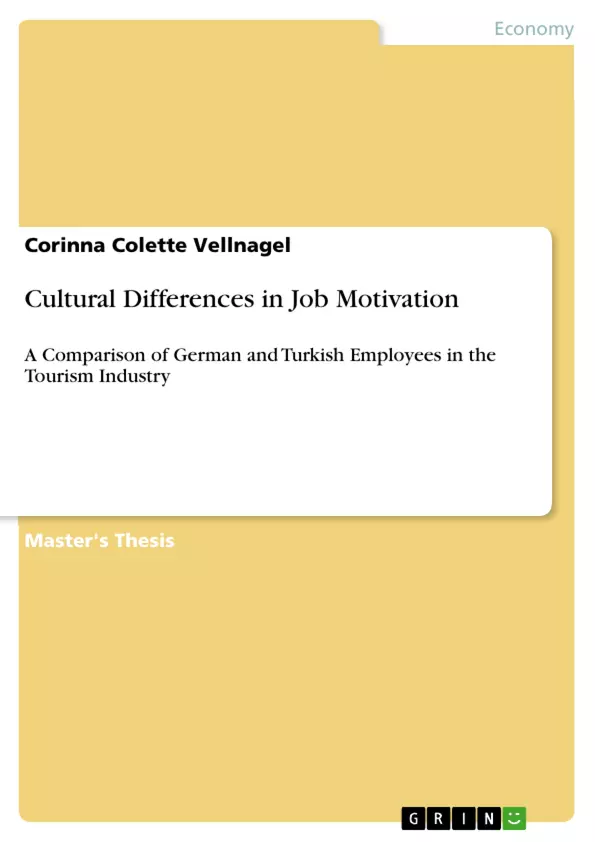What makes people get up in the morning – is it the simple habit, the routine or the sense of purpose? Why do people make promises to do and decide certain things? “Some people get more done than others" (Riley:1996, p.44); while some drift along, others are goal-setters; and some just cannot get started, whereas others are unstoppable. Why is it so? Why do employees ask themselves if it is worth the reward to make “an effort to achieve a goal” (Van der Wagen, Davies:1998, p.24)? The answer can be found in the realm of motivation. Motivation, something that according to various book titles1 needs to be understood, belongs to leadership studies and organisational behaviour. Consequently, “looking at what motivates people, and to lead them, is essential for every manager” (ibid.), because different things might motivate different staff members. One would not expect people to be as complex as they are, but “culture, although not the only variable of importance contributes significantly to explain key differences in social behaviour” (Treven, Mulej, Lynn:2008, p.33). Factors motivating followers in organisations often differ from culture to culture and do not only diverge from different organisational cultures (ibid.: p.34). There is no proof that motives like need for achievement, intrinsic needs for competence and self-efficacy can be generalised across cultures as the specific factors which drive such motives vary across cultures (Gelfand, Erez, Aycan:2007, p.482). This leads to the area of cross-cultural organisational behaviour, which, as well as culture-specific work motivation, only have a relatively short research history, but they actually date back to the times of Dionysios I. from Syrakus2 and Agathon3. Superscripts by Herodotus, a Greek historian, show that differences in work behaviour already existed throughout the time of the Persian Empire (circa 400 BC) (Herodotus, De Selincourt, Marincola:2003). Trade between the different villages and towns and therefore between the different cultures was “widely widespread along the Silk Road”4 (Gelfand, Erez, Aycan:2007, p.481). However, researchers have started focusing “on cultural differences in career development” (Aycan, Fikret-Pasa:2003, p.129) only three decades ago. This new focus has arisen due to globalisation and the increase of multiculturalism in societies and their organisations (Yang et al.:2002). Silk Road”4 (Gelfand, Erez, Aycan:2007, p.481).
Table of Contents
- Introduction
- Overview
- Aims and Motivation of this Study
- Structure
- Theoretical Background
- Motivation
- Definition
- Motivation and Communication
- Overview of Motivation Theories
- Content Theories
- Maslow's Hierarchy of Needs
- Herzberg's Two-Factor Theory
- Process Theories
- Adam's Equity Theory
- Vroom's Expectancy Theory
- Content Theories
- Summary
- Cultural Classifications
- Hofstede's Definition of Culture
- Hall's Cultural Model
- Motivation
- Methodology
- Rationale for the Choice of Quantitative Research Method
- Questionnaire
- Sampling
- Participants
- Questionnaire Design
- Translation
- Piloting
- Statistical Data Analysis
- Ethical Guidelines
- Limitations
- Analysis and Discussion
- Cultural Classification
- Germany
- Turkey
- Analysis and Interpretation
- Applicability of Herzberg's Two-Factor Theory in Turkey
- Cultural Classification
- Conclusion
- Summary
- Contribution of this Study
- Recommendation for Future Research
- Limitations
Objectives and Key Themes
This dissertation aims to investigate culture-specific job motivation within the German and Turkish tourism industry. The study explores how cultural differences influence the rewards sought by employees, their work choices, performance expectations, and overall work values. Key themes explored in this research include:- Cultural influences on job motivation
- Cross-cultural comparisons of employee motivation
- The applicability of western motivation theories to non-western cultures
- The significance of job motivation in the tourism industry
- The impact of economic and societal factors on employee motivation
Chapter Summaries
The introduction provides an overview of the study, outlines its aims, and describes the structure of the dissertation. Chapter two delves into the theoretical framework by defining motivation and discussing its relationship with communication. It further presents an overview of key motivation theories, including content theories such as Maslow's Hierarchy of Needs and Herzberg's Two-Factor Theory, and process theories such as Adam's Equity Theory and Vroom's Expectancy Theory. The chapter concludes with an exploration of cultural classifications, examining Hofstede's and Hall's models. Chapter three details the methodology used in the research. It discusses the rationale behind choosing a quantitative research method, explains the design and implementation of the questionnaire, and explores aspects such as sampling, participant selection, translation, piloting, and statistical data analysis. The chapter also outlines the ethical guidelines followed and acknowledges the limitations of the study. Chapter four presents the analysis and discussion of the research findings. It begins with a cultural classification of Germany and Turkey, followed by an analysis and interpretation of the data collected. The chapter also explores the applicability of Herzberg's Two-Factor Theory in the Turkish context.Keywords
This study focuses on the key concepts of **culture**, **job motivation**, **tourism industry**, **cross-cultural comparison**, **Herzberg's Two-Factor Theory**, **Germany**, and **Turkey**. It examines how cultural differences influence employee motivation, particularly within the tourism industry, highlighting the need for culturally sensitive management approaches.Frequently Asked Questions
Does culture significantly affect employee motivation?
Yes, factors motivating employees often differ from culture to culture, and motives like the need for achievement cannot be generalized across all societies.
What is Herzberg's Two-Factor Theory?
It is a motivation theory that distinguishes between "hygiene factors" (which prevent dissatisfaction) and "motivators" (which encourage positive satisfaction).
How does job motivation differ between Germany and Turkey?
The study analyzes how cultural classifications influence performance expectations and work values in the tourism industries of both countries.
Why is cross-cultural motivation important for managers?
Due to globalization and multiculturalism, managers must understand that different cultural backgrounds require different leadership and motivation strategies.
What cultural models are used to study motivation?
Researchers often use Hofstede's definition of culture and Hall's cultural model to classify and compare societal behaviors.
- Citar trabajo
- M.A. Corinna Colette Vellnagel (Autor), 2011, Cultural Differences in Job Motivation, Múnich, GRIN Verlag, https://www.grin.com/document/184893



